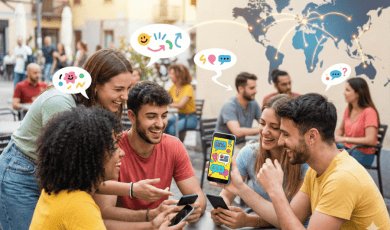
Language is not just a tool we use to communicate; it is a vibrant thread that weaves together the fabric of humanity. Every language—be it English, Mandarin, Swahili, or any of the 7,000 spoken across the globe—holds secrets, stories, and a unique way of viewing the world. The secret power hidden in every language is vast, far-reaching, and often underestimated. In this post, we’ll uncover the captivating mysteries embedded in human languages, their profound impact on societies, and how they connect us in remarkable ways, including their vital roles in global industries such as translation services for healthcare.
The Unique Structure and Genius of Each Language
Every language embodies a unique worldview. The Inuit peoples, for example, have dozens of words for different types of snow, reflecting the centrality of snow in their environment. In contrast, some Indigenous Australian languages do not use words like "left" or "right" but instead orient directions with cardinal points—north, south, east, west. This means that speakers are constantly aware of their orientation in the physical world.
Languages also shape how we perceive time, relationships, and even colors. Did you know that some languages lack words for specific colors or distinguish between objects in ways foreign to English speakers? For instance, Russian speakers have different terms for light blue (“goluboy”) and dark blue (“siniy”), which influences how they differentiate shades. These linguistic distinctions grant speakers nuanced perceptions, fostering deeper cultural and cognitive diversity.
The Cognitive Power of Language
The language you speak can affect how you think. Studies in the field of linguistics and cognitive science reveal that bilingual children often outperform monolingual peers in problem-solving and creativity. The act of switching between languages continually rewires the brain, strengthening executive functions and memory.
Moreover, language can impact our very sense of identity. Immigrants who maintain their mother tongue often feel a stronger connection to their cultural roots. In today’s globalized world, this unconscious power of language can help preserve heritage, even as communities blend and evolve.
Hidden Meanings, Lost in Translation
Some words exist in one language but are untranslatable in others. Take the German word “Fernweh” (a longing for distant places) or the Japanese “Wabi-sabi” (the beauty of imperfection). These words reflect cultural philosophies and values that cannot be perfectly conveyed in English, highlighting the limitations and, at the same time, the hidden depth of every language.
This is where translation services for healthcare become critical, especially in fields where precise understanding could mean the difference between life and death. Translators must navigate not just the literal meaning of words, but the context, connotations, and even the emotions behind phrases to ensure clarity and accuracy.
Language as a Bridge: Breaking Barriers in a Globalized World
In our interconnected world, language barriers can hinder communication, commerce, diplomacy, and healthcare. As countries and industries expand across borders, the demand for expert translation and interpretation continues to rise. The secret power in each language lies in its ability to bring people together, to foster understanding, and to build bridges where none existed before.
Languages in the Service of Health and Humanity
Perhaps nowhere is the power of language more critical than in the realm of healthcare. Imagine a patient seeking urgent medical attention in a country where they do not speak the local language. Misunderstandings between healthcare professionals and patients can have severe consequences. That’s why translation services for healthcare are a vital resource in hospitals, clinics, and research institutions worldwide.
With the rise of global pandemics, international collaboration in research, and the migration of people across continents, the ability to convey medical information precisely is more important than ever. Professional medical translators are trained not just in languages but also in the intricacies of medicine, ensuring that life-saving treatments, consent forms, and research findings are accessed and understood by everyone, regardless of their native tongue.
Fun Facts: How Languages Shape Our World
- Multilingualism is common: Over half the world’s population speaks at least two languages fluently.
- Word count: The Oxford English Dictionary lists over 170,000 words currently in use, but Shakespeare is credited with coining 1,700 of them!
- Gendered nouns: Many languages assign genders to objects—a table can be “la table” (feminine) in French but “el escritorio” (masculine) in Spanish.
- Sign languages: Sign languages, such as American Sign Language (ASL), are full languages with grammar and vocabulary, not just gestures representing spoken words.
- Most spoken languages: English, Mandarin Chinese, and Hindi top the list for most native speakers worldwide, but there are thousands more waiting to be discovered.
Embracing the Secret Power of Language
Every language is a living, breathing testament to human creativity, adaptability, and resilience. When we take the time to learn a new language or delve into another culture’s way of speaking, we unlock hidden powers—new perspectives, deeper empathy, and stronger global connections.
In fields that rely on life-changing decisions, such as healthcare, language is more than words: it becomes the conduit for trust, healing, and hope. Investing in high-quality translation services for healthcare is not just about bridging linguistic gaps but about safeguarding well-being, building understanding, and fostering inclusive communities.
So, the next time you marvel at a foreign phrase or stumble upon an untranslatable word, remember: nestled within every language is a secret power—one that shapes who we are, how we think, and how we care for each other around the world.








